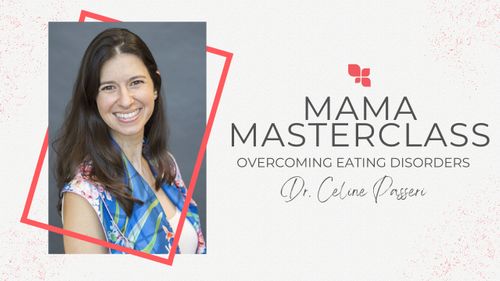
Mental Health & Eating Disorder Recovery
FIT4MOM x Jessica Maurer x Dr. Celine Passeri
In a society where ideals of beauty and perfection are often unattainable standards, it's essential to foster awareness and understanding surrounding eating disorders and disordered eating behaviors. These conditions affect individuals' physical health and profoundly impact their mental and emotional well-being.
As mamas, we face unique challenges when it comes to body image and self-care, especially during pregnancy and postpartum periods. The pressure to "bounce back" and achieve unrealistic standards can exacerbate feelings of inadequacy and fuel disordered eating patterns. While it may not be discussed often, it's important to note that struggling with body image or experiencing disordered eating habits is not uncommon among mothers.
All women can struggle with disordered eating for various reasons, and it's essential to recognize that each individual's experience is unique. Motherhood often brings profound physical changes, such as weight gain, stretched skin, and hormonal fluctuations... all of which can impact a woman's body image and self-esteem. Media and societal pressure, with its emphasis on rapid weight loss and unrealistic beauty standards, can further intensify body image concerns. Women may feel compelled to meet these expectations, leading to disordered eating behaviors.
It's crucial to understand that both disordered eating and eating disorders are serious issues that can affect people of all genders, ages, and backgrounds. Additionally, those with eating disorders can come in all shapes and sizes. Eating disorders and disordered eating often impact the way people think about and consume food, which is not always reflected by their size or weight. Early recognition, intervention, and support are essential for individuals struggling with these challenges to achieve a healthier relationship with food and their bodies.
In our Mama Masterclass Series, Dr. Celine Passeri, a licensed psychologist specializing in eating disorders and mental health, shares invaluable insights. She says, “Eating disorders and disordered eating often emerge as a means of protection against overwhelming emotions or experiences. In moments of distress or trauma, individuals may turn to disordered eating behaviors as a coping mechanism. Despite their initial function as a form of control or relief, these behaviors ultimately prove maladaptive, jeopardizing both physical health and emotional well-being.”
Through education, support, and open dialogue, we can create a safe space for mothers to share their experiences, seek guidance, and find solace in knowing they are not alone. We aim to provide valuable insights, resources, and encouragement to help mothers navigate the complexities of eating disorders and disordered eating with compassion and resilience.
Understanding the Variety
Disordered eating refers to a wide range of irregular eating behaviors and attitudes towards food that may not meet the clinical criteria for an eating disorder but are still problematic and harmful to one's physical and mental health. It often involves patterns such as:
Dieting Obsession: An excessive preoccupation with dieting, calorie counting, or restrictive eating plans, often leading to chronic or yo-yo dieting.
Binge Eating: Consuming large quantities of food quickly while feeling a loss of control but not engaging in purging behaviors (like vomiting or excessive exercise).
Compulsive Exercise: Exercising excessively or compulsively with the primary goal of burning calories rather than enjoyment or fitness.
Negative Body Image: Constantly criticizing one's body, striving for an unrealistic "ideal" body shape, or feeling dissatisfaction with one's appearance.
Fasting or Skipping Meals: Skipping meals frequently, particularly breakfast or lunch, can lead to irregular eating patterns and nutritional deficiencies.
Emotional Eating: Using food as a coping mechanism for emotional distress, stress, boredom, or other feelings.
Disordered eating can have physical, emotional, and social consequences and may lead to more serious eating disorders if left unaddressed.

Eating disorders are clinical, diagnosable mental health conditions characterized by severe disturbances in eating behaviors, body image, and emotions. They are often associated with significant physical and psychological health risks. There are several types of eating disorders, including:
Anorexia Nervosa: Individuals with anorexia have an intense fear of gaining weight and engage in extreme calorie restriction, leading to dangerously low body weight. They often have a distorted body image and may engage in excessive exercise or other purging behaviors.
Bulimia Nervosa: People with bulimia experience recurrent episodes of binge eating followed by compensatory behaviors like self-induced vomiting, laxative use, or excessive exercise to counteract the calories consumed during binges.
Orthorexia Nervosa: An eating disorder characterized by an unhealthy obsession with healthy eating. Individuals with orthorexia take this to an extreme by fixating on the quality, purity, and composition of their meals to the point where it interferes with their daily life and overall well-being.
Binge-Eating Disorder (BED): BED involves recurring episodes of consuming large amounts of food in a short time, often to the point of discomfort, without purging behaviors. It is characterized by a sense of loss of control during bingeing.
Other Specified Feeding or Eating Disorder (OSFED): OSFED is a category that includes eating disorders that don't fit the specific criteria for anorexia, bulimia, or BED but still involve disordered eating behaviors.
Avoidant/Restrictive Food Intake Disorder (ARFID): ARFID is characterized by extreme selective eating or avoidance of certain foods, textures, or smells, leading to restricted dietary intake and potential nutritional deficiencies.
Eating disorders can have serious physical complications, including heart problems, electrolyte imbalances, digestive issues, and more. They also profoundly impact mental health and require professional intervention, including therapy and often medical treatment, for recovery.
Nature vs. Nurture
It is often the interaction between genetic factors and environmental triggers that ultimately leads to the development of an eating disorder.
Genetic predisposition alone does not determine whether someone will develop an eating disorder; rather, it sets the stage for how an individual may respond to environmental influences. These environmental triggers include societal pressures, family dynamics, cultural norms, trauma, and other life stressors.
By recognizing and understanding both the genetic and environmental influences, individuals and healthcare professionals can gain deeper insights into the development of eating disorders. This comprehensive understanding allows for more targeted interventions and treatment approaches that address the underlying genetic vulnerabilities and the environmental factors contributing to the disorder. It also highlights the importance of early intervention and prevention strategies that consider an individual's unique genetic and environmental profile.
Eating Disorders Origins
Dr. Passeri shed light on the role of eating disorders as maladaptive coping mechanisms. She explained that these behaviors often emerge as a means of protection in response to overwhelming situations or trauma. While initially providing a sense of control and relief, these coping mechanisms ultimately prove harmful in the long term.
It's essential to recognize that while these behaviors may offer temporary relief, they ultimately exacerbate underlying issues and contribute to a cycle of emotional distress and physical harm. Over time, individuals may become trapped in a cycle of disordered eating behaviors, which can lead to serious health consequences and negatively impact their quality of life.
Addressing eating disorders as coping strategies requires a comprehensive approach that addresses both the underlying emotional needs and the maladaptive behaviors. This may involve therapy to explore and address the root causes of distress, develop healthier coping mechanisms, and improve self-esteem and body image. Additionally, nutritional counseling, medical intervention, and support from loved ones can play crucial roles in the recovery process.
Early Recognition
Recognizing the signs of disordered eating or eating disorders is crucial for early intervention and seeking help. It's important to remember that these behaviors and symptoms can vary widely among individuals, and not everyone will exhibit all of them. However, some common red flags that may indicate disordered eating or eating disorders include:
Drastic Changes in Eating Habits: Sudden and extreme changes in eating patterns, such as severe calorie restriction, fasting, or avoiding entire food groups (e.g., carbohydrates or fats).
Excessive Exercise: Compulsively engaging in high-intensity exercise, even when injured or unwell, to burn off calories or compensate for eating.
Preoccupation with Food: An overwhelming preoccupation with food, dieting, calories, or body weight that dominates one's thoughts and conversations.
Rapid or Excessive Fluctuation in Weight (Gain or Loss): A noticeable and unexplained drop or increase in weight over a short period. A drop in weight may be accompanied by excessive exercise or purging behaviors.
Binge Eating: Consuming unusually large amounts of food quickly, often with a feeling of loss of control, followed by guilt or distress.
Frequent Dieting or Cleanses: Engaging in a series of diets, cleanses, or detoxes, often without medical supervision, and a tendency to hop from one diet to another.
Food Rituals: Developing rigid rules or rituals around eating, such as eating only at specific times, cutting food into tiny pieces, or arranging food on the plate in a particular way.
Social Withdrawal: Avoiding social events, gatherings, or meals with others due to discomfort around food or body image concerns.
Physical Changes: Physical signs such as extreme fatigue, dizziness, hair loss, irregular menstruation (in females), brittle nails, or the development of lanugo (fine body hair in response to extreme weight loss).
Secrecy and Hiding Food: Hiding food, eating in secret, or disposing of food immediately after eating to conceal consumption.
Body Image Dissatisfaction: Expressing extreme dissatisfaction with one's body, regardless of body size or weight, and a persistent belief that weight loss will lead to happiness or success.
Avoiding Meals or Skipping Meals Frequently: Frequently skipping meals, especially breakfast or lunch, or making excuses to avoid eating with others.
Denial of the Problem: Denying or downplaying the seriousness of eating behaviors or their impact on physical and mental health.
Emotional Changes: Exhibiting mood swings, irritability, or increased anxiety and depression symptoms related to food, body image, or eating behaviors.
Transitioning from Maladaptive to Adaptive Coping Mechanisms
Transitioning from harmful coping mechanisms to healthier alternatives is a vital aspect of the recovery journey for individuals grappling with eating disorders. This transition involves consciously shifting away from behaviors that exacerbate the disorder's grip and embracing strategies that promote mental and emotional well-being. By adopting adaptive coping mechanisms, individuals not only mitigate the immediate effects of their eating disorder but also lay the groundwork for long-term resilience and healing.
Dr. Passeri recommends embracing adaptive coping strategies such as breathing exercises, meditation, outdoor activities, creative pursuits like coloring or painting, and seeking social and medical support. She highlighted the importance of patience and persistence in finding coping mechanisms that resonate personally.
Seeking support from trusted individuals and professional resources is essential for building a solid foundation for recovery. Whether confiding in friends and family, participating in support groups, or seeking guidance from therapists and healthcare providers specializing in eating disorder treatment, reaching out for support can provide invaluable encouragement, validation, and practical assistance. By surrounding themselves with a supportive network of individuals who understand their struggles, individuals can feel less isolated and more empowered to navigate the challenges of recovery.
As Dr. Passeri shares in our Mama Masterclass, “Recovery is full. Completely full.”
If you or someone you care about is grappling with disordered eating or an eating disorder, we urge you to seek support from the National Alliance for Eating Disorders. This reputable organization is dedicated to providing support, resources, and advocacy for individuals affected by eating disorders. With a mission to raise awareness, promote prevention, and offer accessible treatment options, the organization offers various programs and services, including support groups, educational resources, and helplines staffed by knowledgeable professionals. Through their efforts, the National Alliance for Eating Disorders strives to foster a community of understanding and compassion while empowering individuals on their journey toward recovery and improved mental health.
If you liked this blog, check these out:






